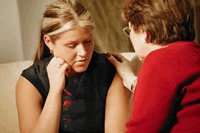With over 20 million Americans age 12 or older having used illicit drugs in the past month, anyone could be at risk for succumbing to the drug epidemic sweeping our nation. The fact that more and more U.S. citizens are using and abusing not only illicit drugs, but also prescription drugs, is an alarming and dangerous trend. To help these people who are using and abusing illicit and prescription drugs, there are drug rehabilitation facilities all over the country.
What is Drug Rehabilitation?
Drug rehabilitation is the process of helping one addicted to drugs, whether they be illicit or prescription, break the cycle of dependence and readjust to life without their drug of choice being a part of it. While most users start off as “recreational” users, it is a slippery slope from there to full blown addiction. Once a person has become addicted to drugs, they need drug rehab.

There are many forms of drug rehabilitation, and the treatment options can vary depending on what drug they are addicted to. The most effective drug rehabilitation will include a drug detox, which rids the body of the drug which is harming it in a controlled environment under medical supervision.
Because the user’s body and brain chemistry has often changed because of the prolonged exposure to the narcotic in its system, this is a delicate process, not without danger. This is why it is always recommended to only attempt drug rehabilitation under the guidance of a trained medical professional who can help you successfully navigate the dangers of detox while also providing comfort and medication to treat the withdrawal symptoms often associated with drug detox.
After drug detox is complete, the process of rehabilitation continues. At a residential drug rehab, the staff will help you to deal with life without drugs, but also with the underlying issues that caused you or your loved one to enter into the cycle of dependence. By resolving underlying issues, you or your loved one have a better chance to stay clean once you are outside of the controlled environment of a residential rehab.
After completing drug rehab, many choose to live at a transitional living home, also known as a sober living home. Here they can be around others in a similar situation as they are, having successfully completed drug rehab and learning coping strategies and life skills to live free of drugs once they leave the sober living home. This semi-structured home provides rules and boundaries that promote good life choices for one dealing with their past drug addiction.





 Need More Help?
Need More Help?


